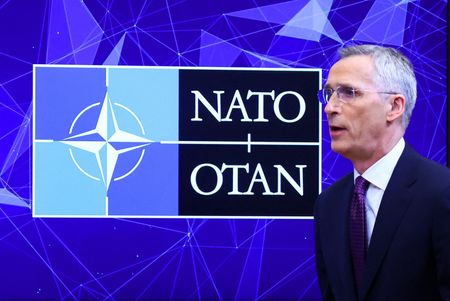 1
1 1
1
By Andrew Gray
BRUSSELS (Reuters) – NATO chief Jens Stoltenberg on Thursday left open the prospect that his term may be extended as senior officials from alliance member countries openly endorsed the idea – including one of his potential successors.
Stoltenberg’s term has already been prolonged three times and he is due to step down in September after nine years as secretary-general of the military alliance, which has assumed even greater importance since Russia’s February 2022 invasion of Ukraine.
But NATO has struggled to find a successor who could win the necessary consensus among its 31 members, stretching from the United States through Europe to Turkey.
Asked if he had been persuaded to stay on during a visit to Washington this week, Stoltenberg said: “I am responsible for all decisions that this alliance has to take except for one. And that is about my future. That is for the 31 allies to decide.”
The job traditionally goes to a senior European political figure but no one can occupy the post without the support of the United States, the North Atlantic Treaty Organization’s predominant power.
Stoltenberg, a former prime minister of Norway, said in February he was not seeking another extension to his term.
Speaking to reporters on Thursday on the sidelines of a meeting of NATO defence ministers in Brussels, Stoltenberg insisted this remained the case.
But he has repeatedly declined to say what he would do if asked to stay on by NATO’s members.
FIRST FEMALE NATO CHIEF?
British Defence Secretary Ben Wallace has said openly he would like the job and Danish Prime Minister Mette Frederiksen has been treated as a serious contender despite insisting she is not a candidate, according to diplomats.
But on Thursday Frederiksen described the idea of Stoltenberg staying on as “a really good solution”.
“I very much like my job and I intend to keep it. So no, I am not on my way to NATO,” she told Danish broadcaster DR.
Wallace is regarded as a long shot as many NATO members argue the post should go to a former prime minister or president to ensure it has top-level political clout, particularly when war is raging on the alliance’s doorstep.
Many NATO countries have also insisted it is high time the alliance has its first female boss, turning the spotlight on Frederiksen, a Social Democrat who became Denmark’s youngest prime minister in 2019 and won reelection last year.
While some countries, particularly in Western Europe, signalled support for Frederiksen, others expressed discontent because Denmark falls well short of the NATO goal of spending 2% of GDP on defence. And some, particularly in Eastern Europe, complained she would be the third NATO boss in a row to come from a Nordic country.
German Defence Minister Boris Pistorius said if there was no sign of the alliance coalescing around a successor, he would welcome an extension for Stoltenberg.
“If we don’t agree on a candidate for the succession, NATO will not be able to make do without a secretary general. So I am naturally in favour of an extension, in particular as I value the cooperation (with Stoltenberg),” he told reporters.
Asked about an extension for Stoltenberg, Finnish Defence Minister Antti Kaikkonen replied: “That option doesn’t sound bad to my ears.”
(Reporting by Andrew Gray; Additional reporting by Louise Breusch Rasmussen and Sabine Siebold; editing by Grant McCool)